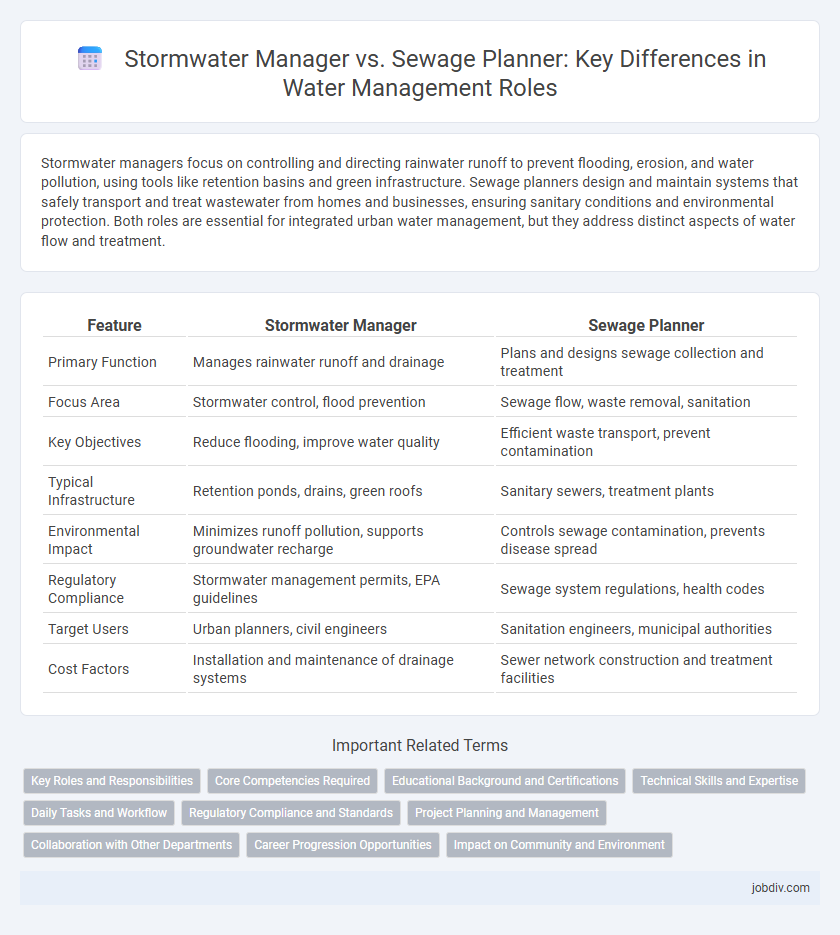Stormwater managers focus on controlling and directing rainwater runoff to prevent flooding, erosion, and water pollution, using tools like retention basins and green infrastructure. Sewage planners design and maintain systems that safely transport and treat wastewater from homes and businesses, ensuring sanitary conditions and environmental protection. Both roles are essential for integrated urban water management, but they address distinct aspects of water flow and treatment.
Table of Comparison
| Feature | Stormwater Manager | Sewage Planner |
|---|---|---|
| Primary Function | Manages rainwater runoff and drainage | Plans and designs sewage collection and treatment |
| Focus Area | Stormwater control, flood prevention | Sewage flow, waste removal, sanitation |
| Key Objectives | Reduce flooding, improve water quality | Efficient waste transport, prevent contamination |
| Typical Infrastructure | Retention ponds, drains, green roofs | Sanitary sewers, treatment plants |
| Environmental Impact | Minimizes runoff pollution, supports groundwater recharge | Controls sewage contamination, prevents disease spread |
| Regulatory Compliance | Stormwater management permits, EPA guidelines | Sewage system regulations, health codes |
| Target Users | Urban planners, civil engineers | Sanitation engineers, municipal authorities |
| Cost Factors | Installation and maintenance of drainage systems | Sewer network construction and treatment facilities |
Key Roles and Responsibilities
Stormwater Managers specialize in controlling surface runoff to prevent flooding, reduce erosion, and improve water quality through sustainable drainage systems and green infrastructure. Sewage Planners focus on designing and maintaining wastewater collection and treatment systems to safely transport and process sewage, ensuring environmental compliance and public health protection. Both roles collaborate to manage urban water systems but differ in emphasis: stormwater on natural water flow and sewage planning on sanitary waste management.
Core Competencies Required
Stormwater managers require expertise in hydrology, watershed management, and infrastructure design to effectively control runoff and prevent flooding. Sewage planners must possess strong knowledge of wastewater treatment processes, sanitation systems, and regulatory compliance to ensure safe and efficient waste disposal. Both roles demand skills in environmental impact assessment and project management, but each focuses on distinct aspects of urban water lifecycle management.
Educational Background and Certifications
Stormwater managers typically hold degrees in environmental science, civil engineering, or hydrology, with certifications such as Certified Stormwater Inspector (CSI) or Certified Erosion, Sediment, and Stormwater Inspector (CESSWI). Sewage planners often have a background in environmental engineering, public health, or urban planning, complemented by certifications like Professional Engineer (PE) or American Planning Association (APA) certification. Both roles require specialized knowledge in water management, but stormwater managers focus more on runoff and water quality, whereas sewage planners emphasize wastewater treatment and infrastructure design.
Technical Skills and Expertise
Stormwater managers specialize in hydrology, drainage design, and flood risk assessment, utilizing GIS technology and hydraulic modeling software to optimize water runoff control. Sewage planners possess expertise in wastewater treatment processes, infrastructure design, and regulatory compliance, employing tools such as SCADA systems and hydraulic analysis for effective sewage system management. Both roles demand proficiency in environmental regulations and infrastructure planning but differ in their focus on stormwater infiltration versus sewage conveyance and treatment.
Daily Tasks and Workflow
Stormwater managers monitor and control runoff to prevent flooding and pollution, conducting site inspections, maintaining drainage systems, and analyzing precipitation data daily. Sewage planners focus on designing and optimizing wastewater treatment and distribution networks, reviewing infrastructure plans, and ensuring compliance with environmental regulations. Both roles require collaboration with engineering teams and using GIS technology to support efficient water management workflows.
Regulatory Compliance and Standards
Stormwater managers focus on controlling runoff to meet environmental regulations such as the Clean Water Act Section 402, which governs National Pollutant Discharge Elimination System (NPDES) permits. Sewage planners adhere to standards set by the Environmental Protection Agency (EPA) and local health departments, ensuring proper treatment and disposal of wastewater to prevent contamination. Both roles require navigating complex regulatory frameworks to maintain compliance and protect public health and water quality.
Project Planning and Management
Stormwater managers focus on green infrastructure integration and flood risk mitigation in project planning, emphasizing sustainable water runoff solutions to reduce environmental impact. Sewage planners prioritize wastewater treatment capacity and pipeline network optimization, ensuring compliance with health regulations and efficient sewage disposal. Both roles require coordinated project management to balance infrastructure resilience, cost-effectiveness, and environmental protection.
Collaboration with Other Departments
Stormwater managers and sewage planners collaborate closely with urban planning, environmental, and public works departments to design integrated water management systems. They share data and coordinate schedules to optimize infrastructure projects, ensuring effective runoff control and sewage treatment. This interdepartmental collaboration enhances resilience to flooding and protects water quality in urban environments.
Career Progression Opportunities
Stormwater managers typically advance by developing expertise in hydraulic modeling and regulatory compliance, leading to roles such as senior environmental engineer or urban water resource manager. Sewage planners progress by gaining experience in wastewater treatment technologies and infrastructure design, which opens pathways to positions like municipal utility director or environmental consultant. Both careers offer opportunities for specialization in sustainable water management and integration with smart city initiatives.
Impact on Community and Environment
Stormwater managers focus on controlling runoff to prevent flooding, reduce pollutants, and protect natural waterways, directly enhancing community safety and preserving ecosystems. Sewage planners design infrastructure to treat and manage wastewater, minimizing health risks and environmental contamination within urban and rural settings. Both roles are critical, with stormwater management emphasizing surface water quality and flood control, while sewage planning ensures sanitary waste treatment and resource recovery.
Stormwater Manager vs Sewage Planner Infographic

 jobdiv.com
jobdiv.com